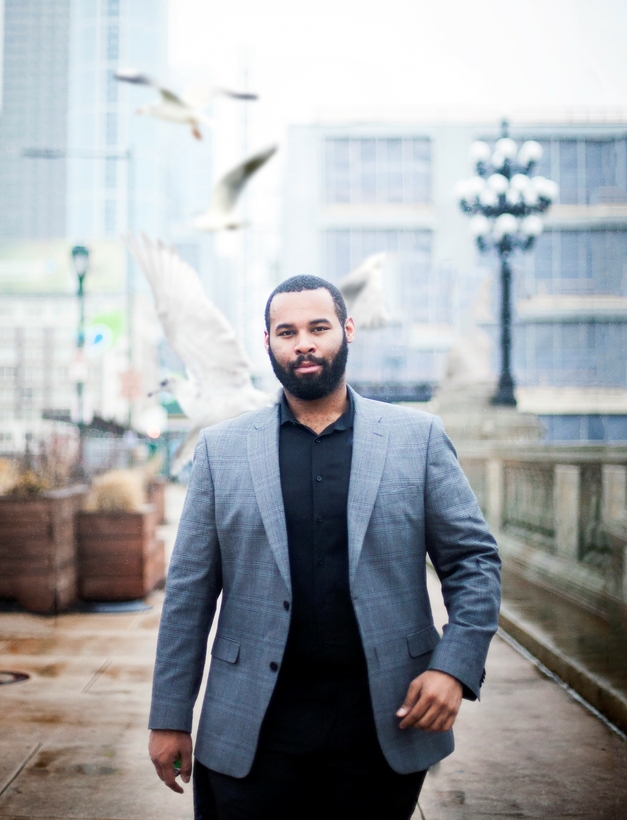To an opera star in waiting, new parts on great stages are necessary rungs up the ladder, but a signature role in one’s pocket is a fine thing, too. Right now, the American tenor Jamez—that’s juh-MEZ (rhymes with fez)—McCorkle is flying high in his debut as the divine Bacchus in Richard Strauss’s mythological fantasy Ariadne auf Naxos at the Royal Opera House, Copenhagen. For the foreseeable future, though, his streak in the role that put him on the map is over. That role would be Omar, in the Rhiannon Giddens/Michael Abels opera of the same name, based on the 19th-century memoir A Muslim American Slave: The Life of Omar ibn Said. Anywhere between 10 to 30 percent of Africans trafficked to America as slaves were Muslim (estimates vary), but Omar’s manuscript is the only known document of its kind.
The opera’s unveiling took place two years ago at the Spoleto Festival USA, in Charleston, South Carolina, steps away from the block where the historic Omar was put up for auction. The reviews were glowing, and encores quickly followed in Los Angeles, Chapel Hill, Boston, and San Francisco. As icing on the cake, the opera won the Pulitzer Prize for Music in 2023. Unaccountably, though, there’s no commercial recording, and no further revivals have been announced.
With his gentle but stately bearing, mellow timbre, and sensitive phrasing, McCorkle filled his role richly. Yet the opera leaves key questions open—as does the source material. Omar knew his Qur’an and wrote fluent Arabic. Might he eventually even have embraced Christianity? We just don’t know. “Beggars can’t be choosers,” says McCorkle, who is now 34. “This is some of the only history we have from someone who actually experienced it. All we can do is express what we have with as much truth as we can.”
But let’s not lose sight of McCorkle in his many other guises. On a recent Zoom call from Denmark, he filled us in on where he comes from and where he’s going.
MATTHEW GUREWITSCH: How did you wind up in opera?
JAMEZ McCORKLE: I got into classical music from four years old, by my own choice. I heard the choir director play a piano solo one day, and I said, “I wanna do that.” So, my mother got me started on piano lessons. In my teens at the New Orleans Center for Creative Arts, I heard a friend sing “Total eclipse,” from Handel’s Samson, and I said, “That’s for me.” I asked the voice teacher for the music and memorized it overnight. The next day I sang it for her, but she didn’t say anything. By the end of high school, I didn’t have the drive for piano anymore, and she said, “You can join the voice program if you want.” I said, “I’ll give it a shot.”
M.G.: I don’t imagine you were anticipating making your mark in a contemporary opera.
J.M.: I didn’t have any conception of what contemporary classical music might be. All I wanted was to be Dmitri Hvorostovsky! I was still a baritone then. But by the time I made my Spoleto debut, in 2017, I was a tenor. They gave me Lensky, in Eugene Onegin, which went really well. And when they started talking about Omar, they threw my name in the mix and insisted that I should do it.
M.G.: Apparently you also did a staged version of Schumann’s Dichterliebe, singing the songs and accompanying yourself on piano?
J.M.: We had a live actor behind a screen, interacting with projections from out front. I just had to sit there and sing pretty and tickle the ivories.
M.G.: You don’t have the biggest YouTube footprint, but there’s some lovely, lyrical Italian music there. Yet here you are, singing Bacchus, a proto-heroic role lots of tenors have nightmares about.
J.M.: Do they? I think Bacchus fits me like a glove! I got it after I jumped into Reimann’s Lear in Munich at very short notice.
M.G.: Speaking of nightmares. That’s industrial-strength postwar German serialism.
J.M.: My manager called and asked, “Can you hop a flight to Munich tomorrow for Reimann’s Lear? A singer had to drop out.” I said, “Absolutely.” Then my agent asked if I knew Reimann. “I can learn who he is,” I said, and started learning my part on the airplane. I learn quickly. It comes from my piano background.
M.G.: What is your plan moving forward?
J.M.: I’m diving headfirst into Wagner! I rearranged my vocal technique recently, and suddenly everything just clicked. It’s as if I didn’t even know how to sing before. And now it’s so easy.
M.G.: So, addio to the Italians?
J.M.: When people put you into a box, it limits your potential to grow. My voice is versatile. It’s lyrical but it’s big, so I can sing whatever I want. I’m not worried. Once people start to pick up on my existence, things will come. If people ask me, I’d love to do Puccini.
Ariadne auf Naxos is on at the Royal Opera House, in Copenhagen, until April 14
Matthew Gurewitsch writes about opera and classical music for AIR MAIL. He lives in Hawaii

